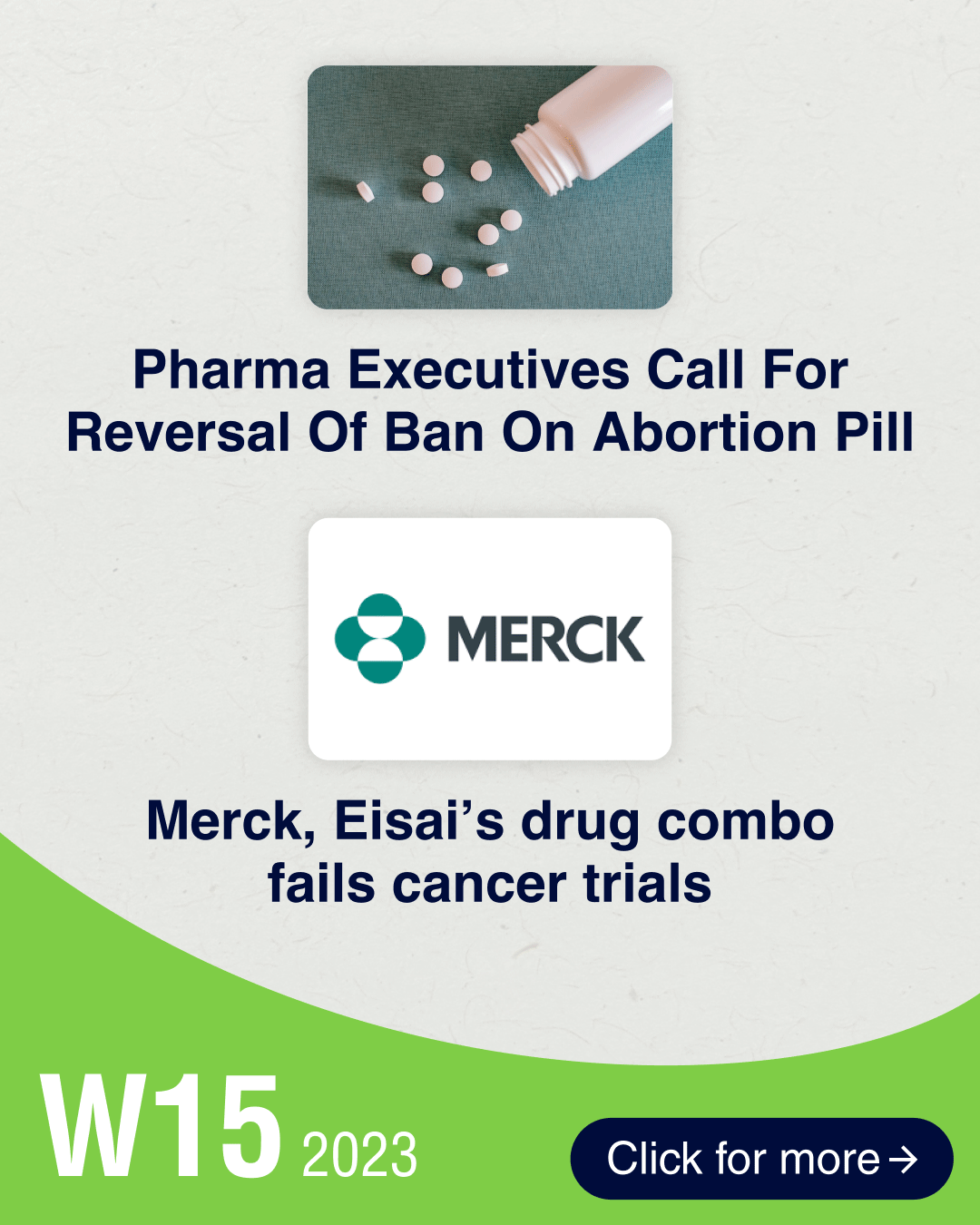
By PharmaCompass
2023-04-13
Impressions: 754
Over 300 pharma and biotech executives, including Pfizer CEO Albert Bourla and Biogen president Alisha Alaimo, have signed an open letter calling for the reversal of a Texas judge’s decision to suspend sales of abortion pill mifepristone.
Sanofi has withdrawn and refiled its proposal to acquire Provention Bio to give the Federal Trade Commission (FTC) more time to complete its review of the deal that involves two diabetes drug developers.
Merck and Eisai have discontinued two late-stage studies of their cancer medicines – Keytruda and Lenvima – after the drug combination failed two separate trials in skin and colon cancer. The US Food and Drug Administration (FDA) has asked Merck KGaA to pause the initiation of new patients in a multiple sclerosis drug trial as laboratory results have suggested that the drug may be causing liver injuries in patients enrolled in the study.
Moderna’s experimental messenger RNA flu vaccine for adults – mRNA-1010 – has failed to achieve “early success” in a late-stage trial due to lack of adequate cases.
Meanwhile, AbbVie and J&J are voluntarily withdrawing the use of their blockbuster blood cancer drug Imbruvica in two less common forms of lymphoma, after phase 3 confirmatory trials failed to convince FDA of the med’s efficacy.
In regulatory news, a month after Covis Pharma voluntarily withdrew its preterm birth drug Makena from the US market, FDA revoked accelerated approval of the hormonal treatment, citing its ineffectiveness in treating the complication.
Pharma executives call for reversal of Texas judge’s decision to ban abortion pill
Over 300 pharma and biotech executives, including Pfizer CEO Albert Bourla and Biogen president Alisha Alaimo, have signed an open letter calling for the reversal of a Texas judge’s decision to suspend sales of abortion pill mifepristone. The judge suspended the drug’s approval while hearing a case filed by anti-abortion groups.
FDA had approved mifepristone in 2000 as part of a two-drug regimen that currently accounts for more than half of all US abortions. Since then, the agency has determined its safety on multiple occasions.
The drugmakers claimed that the decision disregards scientific evidence and legal precedents, and undermines FDA’s authority to regulate drugs.
The Department of Justice has also appealed the decision to the 5th US Circuit Court of Appeals, stating that the decision endangers women’s health by blocking access to a pill deemed safe for a long time. Meanwhile, abortion opponents have urged the court to allow the suspension of FDA’s approval of mifepristone.
Merck, Eisai’s Keytruda-Lenvima drug combo fails two late-stage cancer trials
Merck and Eisai have discontinued two late-stage studies of their cancer medicines – Keytruda and Lenvima – after the drug combination failed two separate trials for skin and colon cancer. In the first trial, the Keytruda-Lenvima combination did not improve overall survival in adults with unresectable or metastatic melanoma compared to Keytruda alone. In the second trial, although the Keytruda-Lenvima combination showed improvement across various measures in adults with unresectable and metastatic colorectal cancer, the results were not statistically significant.
FDA pauses new patient initiations on Merck KGaA’s MS drug: FDA has placed a partial clinical hold on the initiation of new patients on Merck KGaA’s multiple sclerosis (MS) drug — evobrutinib. The company said the action was based on two recently reported cases of laboratory values suggesting drug-induced liver injury. Merck KGaA has been ahead in the race to develop a drug that belongs to the class of Bruton’s tyrosine kinase (BTK) inhibitors to slow the progression of MS. But the tolerability of BTK inhibitors has been a concern. FDA’s action resulted in a 6.3 percent slide in the German drugmaker’s share price on Wednesday.
AbbVie, J&J withdraw Imbruvica’s use in two lymphomas: AbbVie and J&J are voluntarily withdrawing the use of their blockbuster blood cancer drug Imbruvica in two less common forms of lymphoma after two phase 3 confirmatory trials failed to convince the FDA of the med’s efficacy. The agency had granted accelerated approval to the drug for previously treated mantle cell lymphoma (MCL) and marginal zone lymphoma (MZL).
Moderna’s mRNA flu jab falls short of ‘early success’ in late-stage trial
Moderna’s experimental messenger RNA flu vaccine for adults – mRNA-1010 – has failed to achieve “early success” in a late-stage trial due to a lack of “sufficient cases”. In an earlier late-stage trial, the vaccine induced a robust immune response to influenza A strains but was found to be less effective against influenza B strains. Moderna said it has developed an updated version of the vaccine and plans to begin a confirmatory phase 3 trial later this month.
Meanwhile, Moderna has won its legal dispute with Arbutus Biopharma over patents for its Covid-19 vaccine. An appeals court has upheld the decision of the US Patent and Trademark Office tribunal, which declared Arbutus’ patent for its lipid nanoparticle technology as invalid.
Sanofi refiles proposal to buy Provention Bio to give FTC more time to review deal
Sanofi has withdrawn and refiled its proposal to acquire Provention Bio to give the FTC more time to complete its review of the deal involving two diabetes drug developers. The French pharma took this decision following an informal discussion with the US antitrust watchdog.
The refiling has effectively reset FTC’s preliminary review period to 15 days for a cash tender transaction, and a decision is expected by April 25. To accommodate this change, Sanofi has extended its offer to buy Provention Bio’s shares by six days, until April 26. Despite the delay, Sanofi remains hopeful about closing the deal in the second quarter of the year.
FDA withdraws approval of Covis Pharma’s controversial preterm birth drug Makena
A month after Covis Pharma voluntarily withdrew its preterm birth drug Makena from the US market, FDA has revoked the accelerated approval granted to the hormonal treatment, citing the drug’s ineffectiveness in treating the complication. Withdrawal of the drug’s approval will also apply to cheaper copycat versions of the drug, FDA said.
Makena, which was approved in 2011, was the only available therapy for preventing premature labor, a complication that is linked to a higher risk of death and disability in newborns. However, a 2019 study found the drug ineffective.The PharmaCompass Newsletter – Sign Up, Stay Ahead
Feedback, help us to improve. Click here
Image Credit : Phisper Infographic by PharmaCompass license under CC BY 2.0
“ The article is based on the information available in public and which the author believes to be true. The author is not disseminating any information, which the author believes or knows, is confidential or in conflict with the privacy of any person. The views expressed or information supplied through this article is mere opinion and observation of the author. The author does not intend to defame, insult or, cause loss or damage to anyone, in any manner, through this article.”








